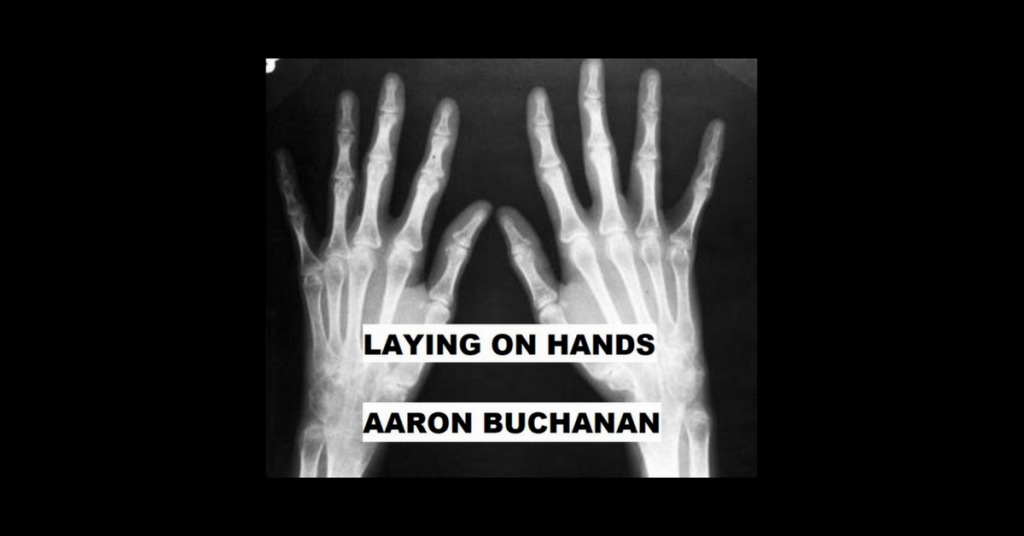At Garron Lake Baptist, all the hands were up in supplication to God as bodies swayed and voices sang “Just As I Am.” In the front, Pastor Charlie Schmidt was laying his sweaty, psoriasis-afflicted hands on Grace Switowski.
Pastor Schmidt prayer was heard above the din of chanting, moving bodies. His voice elevated above the song, booming out over the microphone clipped to his lapel each time he said “blood” of our savior, Jesus Christ.
Grace Switowski was 24. Stringy brown-gray clumps of hair fell from patches on her mostly-bald head like wet papier-maché. At the front of the worship hall, the pastor, the church deacons, Grace’s parents, four brothers and sister watched Grace in her wheel-chair as the preacher anointed her and laid on his hands.
It was 1985 and she was in stage four lymphatic cancer.
I was seven and in my groove. I sang the song. I didn’t need the hymnal. I’d been to church since popping out of my mother’s vagina, fully spawned, in leisure suit, and with a King James Bible tucked under my tiny, cherubic arms.
My older brother, Jeremiah—named for the Hebrew prophet, of course—sat on a pew next to me, doodling a crude representation of a woman with big tits and hairy muff looking cross-eyed at an oddly-muscled and veiny dick protruding from a curly patch of pubic hair lining the bottom of the page. Jeremiah and Kenny pointed, laughed.
This act of pornographic defiance was drawn on the back of this week’s church bulletin.
Jeremiah was 14 and always doing things like this. It was a contest between him and his best friend, Kenny, who never took showers and never went home and whose parents never seemed to care if he did. He was on the pew next to Jeremiah, pointing, laughing.
The ceremony went on for at least 30 minutes after Kenny and Jeremiah’s bulletin-drawing. While Grace’s family, her mom, her dad, her brothers, and other members of the congregation were on their knees praying for and over the young Grace, the ever-peculiar Jeannie Thompson laid supine in the aisle, arms stretched toward the ceiling. The even weirder Rebecca Kent sat on her knees next to Mrs. Thompson, bending over, sobbing, sitting upright, raising her hands to God, praising Jesus, and singing piecemeal the words of “Just As I Am” before returning her face flush to the floor.
The song-leader motioned for a repeat of the hymn and our mom pedaled the intro to the hymn on her organ.
Pastor Schmidt’s prayers had grown to a whisper. I forgot about telling on Jeremiah and Kenny and I gave myself over to the words:
Just as I am—poor, wretched, blind;
Sight, riches, healing of the mind,
Yea, all I need, in Thee to find,
—O Lamb of God, I come!
The music stopped, suddenly, almost violently. And I was somewhere else. I opened my eyes and found myself unable to look at the room. My head was swimming and I blinked my eyes open-closed-open-closed rapidly in panic.
I was in a small house, stone masonry making up the walls. Ahead of me was a woman sitting at a desk, staring out the small squares of an old window whose ancient glass made circular puddles of the view outside. With the sun shining through, I could make out the woman’s shape. But I also heard her humming. The woman stood up from her desk and steadied herself uneasily, warily. When her eyes met mine, her mouth opened to…
And then I was back and on the floor, listening to Jeremiah.
“You all right, Asa? C’mon, man, you, all right?”
My eyes felt glued to the tops of my skull and I tried to stare through the static orange of my eyelids. In that moment, I was hyper-aware of my surroundings: the antique oak pews my own uncle had refinished, Kenny sticking his hand through his shirt and up to his armpit, making fart noises that, over the continued singing, I could not hear. I also had somehow lost my sense of identity. Jeremiah and Kenny both said my name, but it was a word I felt no connection with.
No one else in the church paid us any mind. Jeremiah had me by the collar of my dress shirt, shaking me. I said something to him that I had no recollection saying.
On the way home from church that Sunday night in 1985, Jeremiah rode in the front seat of our mom’s Impala, he turned the radio up—the rock station out of Kalamazoo my mom never let us listen to on Sundays, but even she must have been sick of hymns after two hours on the organ. He turned around to Kenny and put up his devil-rock horns on his fingers and stuck out his tongue, then swiveled around and rub-patted me my head.
“You said you thought you went back in time,” he tousled my hair in a way he had not done since my baby-blonde hair had turned its permanent coffee black.
I sat back, said nothing, lost myself in “Modern Love” on the radio.
A week and four days after the cheirotonia—the laying-on of hands ceremony—my mom played the organ at Grace Switowski’s funeral.

